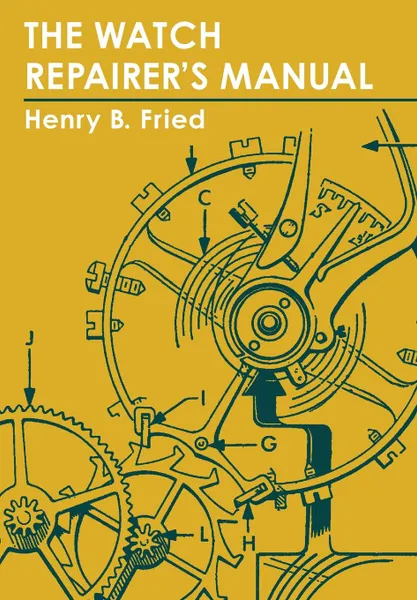The Watch Repairer's Manual 12+
Автор: Henry B. Fried
2013
326 страниц
Категория: Литература на иностранных языках
ISBN: 9781626549982
Язык: Английский
📘 As The New York Times wrote after his death, Henry B. Fried was "widely acknowledged as the dean
of American watchmakers." In the revised, 1961 edition of his classic book The Watch Repairer's
Manual, reprinted here, Fried addresses topics important to contemporary watch repairers, such as
self-winding watches, waterproofing, calendar watches, alarm wristwatches, and chronographs. The Watch
Repairer's Manual also includes a fine visual dictionary of exploded views in isometric, which are very
helpful for ordering watch parts.
One of the few modern books available on the techniques of watch repair and certainly the most esteemed,
The Watch Repairer's Manual is outstanding for its sequence of presentation and its many useful
illustrations, including enlarged details of alarm and self-winding watches. The consummate craftsman and
master of details, Fried himself created the illustrations. From teaching others, Fried has learned that if
you have a good understanding of how and why the mechanisms work, you will become better at fixing any
problems you face-often without needing to consult a book.
The Watch Repairer's Manual provides:
- Helpful background material, such as full descriptions
of the main divisions of the modern watch mechanisms,
including the purpose and function of each unit.
- Complete directions for cleaning and overhauling a watch movement for casing.
- A section devoted to general repairs and troubleshooting.
For anyone interested in watch repair, this volume will serve as a working manual, a reference manual,
and even a course of study. Assuming little previous knowledge on the part of the reader, Fried provides
complete and clear detail on each operation. The Watch Repairer's Manual should be of great value to
the student, hobbyist, watch collector, and instrument maker. Henry B. Fried wrote and illustrated 14
books, many pamphlets, and hundreds of articles on horology, the science of timepieces. The first American
to receive the Silver Medal of the British Horological Institute, he served as president of the New York
City Horological Society and the New York State Watchmakers Association and vice president of the old
Horological Institute of America. He taught and lectured on horology and served as an industry consultant.
He also was a consultant for the Random House Dictionary and the Merriam-Webster Dictionary.
of American watchmakers." In the revised, 1961 edition of his classic book The Watch Repairer's
Manual, reprinted here, Fried addresses topics important to contemporary watch repairers, such as
self-winding watches, waterproofing, calendar watches, alarm wristwatches, and chronographs. The Watch
Repairer's Manual also includes a fine visual dictionary of exploded views in isometric, which are very
helpful for ordering watch parts.
One of the few modern books available on the techniques of watch repair and certainly the most esteemed,
The Watch Repairer's Manual is outstanding for its sequence of presentation and its many useful
illustrations, including enlarged details of alarm and self-winding watches. The consummate craftsman and
master of details, Fried himself created the illustrations. From teaching others, Fried has learned that if
you have a good understanding of how and why the mechanisms work, you will become better at fixing any
problems you face-often without needing to consult a book.
The Watch Repairer's Manual provides:
- Helpful background material, such as full descriptions
of the main divisions of the modern watch mechanisms,
including the purpose and function of each unit.
- Complete directions for cleaning and overhauling a watch movement for casing.
- A section devoted to general repairs and troubleshooting.
For anyone interested in watch repair, this volume will serve as a working manual, a reference manual,
and even a course of study. Assuming little previous knowledge on the part of the reader, Fried provides
complete and clear detail on each operation. The Watch Repairer's Manual should be of great value to
the student, hobbyist, watch collector, and instrument maker. Henry B. Fried wrote and illustrated 14
books, many pamphlets, and hundreds of articles on horology, the science of timepieces. The first American
to receive the Silver Medal of the British Horological Institute, he served as president of the New York
City Horological Society and the New York State Watchmakers Association and vice president of the old
Horological Institute of America. He taught and lectured on horology and served as an industry consultant.
He also was a consultant for the Random House Dictionary and the Merriam-Webster Dictionary.
Мнения
